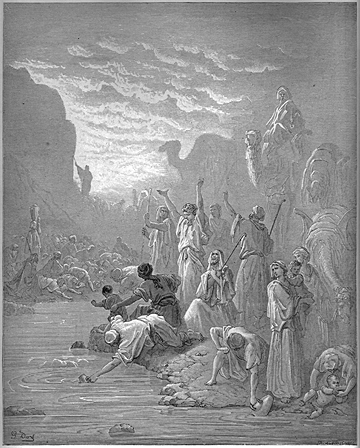Exodus 17
1 Obeying what Yahweh commanded, all the Israeli people moved from the Sin Desert. They/We traveled from one place to another. They/We camped at [a place named] Rephidim, but there was no water there for (the people/us) to drink.
Oganda jo-Israel duto nochako wuoth kawuok e thim mar Sin, ka giwuotho ka gi kacha mana kaka Jehova Nyasaye nochikogi. Ne gibworo Refidim, to ne onge pi mane ji nyalo modho.
2 So the people complained to Moses/me again, saying, “Give us water to drink!” Moses/I replied to them, “Why are you (criticizing/arguing with) me [RHQ]? And why are you trying to determine whether Yahweh [has the power to provide for you]?”
Kuom mano negidhawo gi Musa kagiwacho niya, “Miwa pi wamodhi.” To Musa nodwokogi niya “En angʼo momiyo udhawo koda? En angʼo momiyo uketo Jehova Nyasaye e tem?”
3 But the people were very thirsty, and they continued to complain to Moses/me. They were saying things like “Why did you bring us out of Egypt?”, and “Did you bring us here to cause us and our children and livestock to die (from thirst/because we had no water to drink) [RHQ]?”
To kata kamano ji ne riyo mar pi oloyo kanyo, kendo ji nongʼur ni Musa. Negiwachone niya, “En angʼo momiyo nigolowa Misri mondo nyithindwa kaachiel gi jambwa otho?”
4 So Moses/I prayed earnestly to Yahweh. He/I said, “(How shall I deal with these people?/I do not know how to deal with these people!) [RHQ] They are almost ready to [kill me by throwing] stones at me!”
Eka Musa noywak ni Jehova Nyasaye niya, “En angʼo mowinjore atim kod jogi? Gichiegni kata mana goya gi kite.”
5 Yahweh replied to Moses/me, “Take some of the elders/leaders of the Israeli people with you and [tell the rest of] the people to follow you [to Sinai Mountain]. Take along the stick with which you struck the Nile [River].
Jehova Nyasaye nowacho ne Musa niya, “Wuothi idhi e nyim oganda. Kaw jodong jo-Israel moko mondo odhi kodi kendo kaw luth mane ichwadogo aora Nael mondo idhigo.
6 Listen carefully: I will stand in front of you on top of a [large] rock at the foot of the mountain. Strike the rock with your stick. [When you do that], water for the people to drink will flow out of the rock.” [When they/we arrived at the mountain], Moses/I did that while the Israeli elders were watching, [and water flowed from the rock].
Abiro chungʼ e nyimi e bath lwanda mantie Horeb. Chwad lwanda to pi nowuog kuome mi oganda nomodhi.” Kuom Mano Musa notimo kamano e nyim jodong jo-Israel duto.
7 Moses/I gave that place two names [in the Hebrew language: ] Massah, [which means ‘testing’], and Meribah, [which means ‘complaining’]. He/I gave it the name Massah because the Israeli people were testing Yahweh, saying “Is Yahweh really among us [and able to help us], or not?”, and he/I gave it the name Meribah because they were [continually] complaining.
Eka nochako kanyo ni Masa kod Meriba nikech jo-Israel nogwandore kanyo to bende nikech ne gitemo Jehova Nyasaye kagiwacho niya, “Bende Jehova Nyasaye ni e dierwa koso?”
8 Then the descendants of the Amalek people-group came and fought against the Israeli people at Rephidim.
Jo-Amalek nobiro momonjo jo-Israel Refidim.
9 Moses/I said to Joshua, [who was one of our army/Israeli leaders], “Choose some men to go out and fight against the Amalek people-group tomorrow. I will stand on the top of the hill, holding the stick that God told me to carry.”
Eka Musa nonyiso Joshua niya, “Yier jomoko kuom jowa mondo idhi iked gi jo-Amalek. Kiny anachungʼ ewi got gi ludh Nyasaye e lweta.”
10 So Joshua did what Moses/I told him to do. He took some men to fight against the Amalek people-group. [While they were fighting], Aaron, Hur, and Moses/I went up to the top of the hill [so that they/we could see the whole battle area].
Kuom mano Joshua nokedo gi jo-Amalek mana kaka Musa nochiko, kendo Musa gi Harun kod Hur nodhi ewi got.
11 Whenever Moses/I lifted up his/my arms, the Israeli men started to win [the battle]. And whenever he/I lowered his/my arms, the Amalek people-group started to win.
E kinde duto mane Musa osiko kotingʼo bedene malo, to jo-Israel ne loyo, to kane Musa odwoko bedene piny, to jo-Amalek ema ne loyo.
12 But his/my arms became tired. So Aaron and Hur [rolled] a [large] stone for Moses/me to sit on. [While he/I was sitting on it], those two held up his/my arms, [one on one side and the other on the other side]. In that way, they kept his/my arms lifted up, and his/my arms held steady until the sun went down.
Ka bede Musa nojony, to negikawo kidi mi giketone mondo obedie. Harun gi Hur ne ojuko bedene kotingʼo malo, ka ngʼato achiel omako bade konchiel, to machielo omako komachielo, omiyo bedene nosiko kochungʼ tir nyaka podho chiengʼ.
13 So Joshua and the men with him completely defeated the Amalek people-group, using their swords [to fight against them].
Kuom mano Joshua noloyo jolwenj jo-Amalek mana gi ligangla.
14 Then Yahweh said to Moses/me, “Write an account of this battle, and then read it to Joshua. [Also write that some day] I will completely get rid of the Amalek people-group.”
Eka Jehova Nyasaye nowacho ne Musa niya, “Ndik wachni e kitap ndiko kaka gima ibiro par bende nyaka ine ni Joshua owinje, nimar abiro tieko jo-Amalek duto e piny ka.”
15 Then Moses/I built a [stone] altar there and named it ‘Yahweh is [like] my flag’.
Musa nogero kendo mar misango mochake ni “Jehova Nyasaye en banderana.”
16 He/I said, “Hold high Yahweh’s flag! Yahweh will continue to fight against the Amalek people-group (forever/in all future generations)!”
Nowacho kama, “Nimar bede notingʼ malo e nyim kom duongʼ mar Jehova Nyasaye. Kendo Jehova Nyasaye noked gi jo-Amalek e tienge duto.”





















